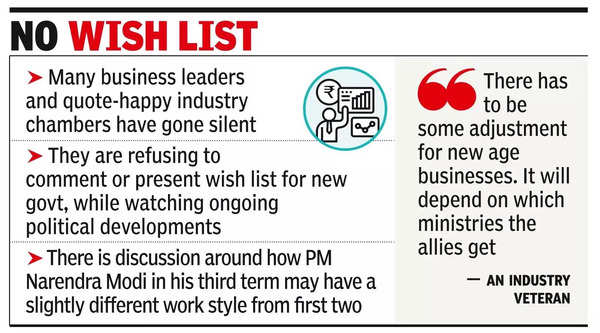Tuesday’s election verdict has not only made them sit up and take note of the changes that may come about when the new cabinet is sworn in, but even traditional businesses that thrived during the post-reforms coalition era, are now discussing adjustments.
Most business leaders and the quote-happy industry chambers have gone silent, refusing to comment or even present their wish list for the new govt, as they watch political developments unfold in the Capital. There is discussion around how PM Narendra Modi in his record-equalling third term may have a slightly different work style from the first two.
“There has to be some adjustment for the new-age businesses. It will depend on which ministries the allies get,” said an industry veteran. Over the years, some familiarity with some of the ministers has also crept in.
While businesses may not be entirely happy with how govt reacted to some of their comments in public, they have no complaints about how their issues were addressed. “If it is an industry issue, we have always received a patient hearing, even with ministers present in those meetings. And, if a solution could not be found we were asked to write the details and suggestions, and there was an attempt to address them,” a large investor in India said.
Even traditional businesses have found ways to raise their issues, meeting ministers directly or flagging it to PMO.

Unlike the earlier regimes, where middlemen could often be seen in ministry corridors, CEOs of large companies have been able to directly approach ministries in the last 10 years.
Analysing the mandate, an executive with an overseas entity working in India, said investors are watching how the favourable macro-economic situation is converted into micro-focused strategy that deals with challenges related to jobs or addresses price rise issues. “There may not be big directional changes but there now needs to be greater consensus on reforms,” the executive said.
So, labour reforms, which will not just benefit factories but also gig workers, are areas where there are some concerns, given that several states were not backing the rules under the Labour Codes and opposition may grow.
“The overall opportunity in India remains intact, given the fast growth and large market. Next six months or a year will tell us if coalition politics has helped make govt more open to building consensus,” said an industry veteran.

Comments